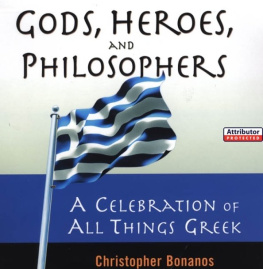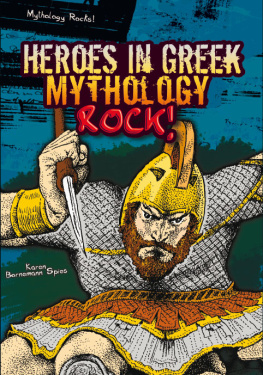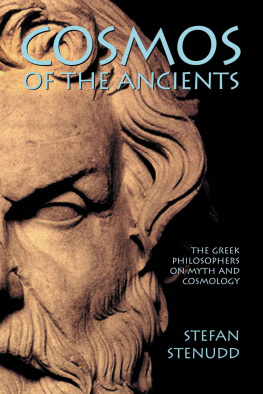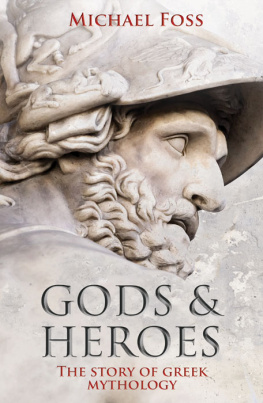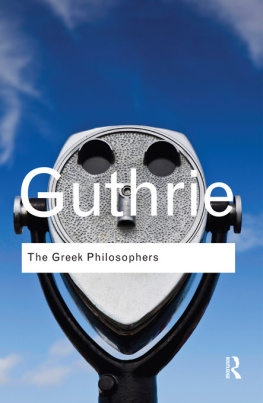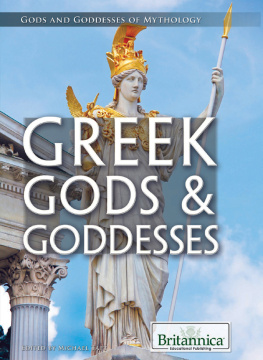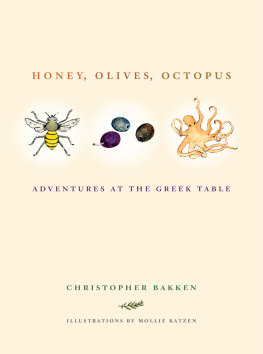G ODS , H EROES , AND P HILOSOPHERS
A Celebration of All Things Greek
Christopher Bonanos
CITADEL PRESS
Kensington Publishing Corp.
www.kensingtonbooks.com
All copyrighted material within is Attributor Protected.
To Mom and Dad
Sagapo
Acknowledgments
Special thanks to Anastasia Rubis, who called me in at the start of this project and was generous and graceful when our plans diverged.
Doubly special thanks to Katherine Lumb, for tolerating a writers cranky distraction for months.
And love and gratitude to Costandino, Costandina, Panagiotis, Argyris, and Agathoniki. Because they left Greece long ago, I am able to lead a very different life from theirs and return on my own terms. For that, I am immeasurably grateful.
Roast Lamb
Certainly, Greeks are not the only ones who get a great deal of pleasure out of lamb. In India, it goes into the tandoor oven; in Mongolia, into sizzling oil; in Ireland and France, into the stewpot. But the Greek affection for lamb is singular. Slow-cooked on a rotating spit or roasted in the oven and then served with lemony roasted potatoes, orzo, or rice, a leg of lamb is the fundamental special-occasion dinner for Greeks all over the world. A solid dose of garlic is customary; so, unfortunately, is a tendency to overcook it. (Careful Greek chefs have learned, slowly, that leaving the lamb pink at its center improves the flavor and texture immeasurably.)
Today, of course, one can order a leg of lamb at any time of the year and roast it without much fuss. But in the age before easy transportation and refrigeration, the serving of a spring lamb was an extraordinarily special event. Sheep in the mountains of Greece bear their young at the end of the winter, and the lambs are ready for the market just in time for Easter, the most important day in the Greek Orthodox religion and the biggest event on the Greek calendar. (Rural families raised their own lambs; city families would buy them.) In the region of mainland Greece known as Roumeli, where much of the countrys livestock is raised, roasting lambs on spits line the streets for the holiday, and you can probably imagine for yourself right now just how good it smells. (Milos, an excellent restaurant in New York City, sets up a fire pit with a rotisserie on the sidewalk every Easter and roasts several lambs outside. Its a striking sightthis primitive-looking arrangement on a Manhattan sidewalkand the wafting scent is excellent for business.)
The Easter feast is of course celebratory, but it is also extremely practical. The holiday follows forty days of Lenten fasting from meat and animal products. For a hardworking farm family coming out of winter, that was a significant hardshipand when it came time to break the fast, they were surely not about to give up one scrap of protein. As a result, everything from that animal was used. To this day, the first food with which one breaks the Lenten fast is a hearty soup, made from the liver and other innards of the lamb, called magheritsa. Its served in the early hours of the morning, as the faithful return home from the midnight mass commemorating the Resurrection. Other parts of the animal go into sausages called kokkoretsi , into meatballs called keftedes , into stuffed cabbage, and onto skewers for souvlaki . Nothing is wastedand its all tasty.
Feta Cheese
Greece produces a lot of sheep and goats, and therefore a lot of cheese. Theres halloumi, the smelly, tangy white cheese thats a signature product of the island of Cyprus. Theres kasseri, an aged semisoft cheese, made in large wheels, thats a bit like provolone. Theres graviera, a rather hard, sweet, mild cheese along the lines of Romano. But none of themand perhaps no Greek foodis as well known as feta.
Its made from sheeps, goats, or cows milk, or sometimes a mixture thereof, and is rather heavily salted. There have been endless arguments over which milk is authentic, but all three have their regions and devotees. (If youre used to the American version, which is usually made with cows milk, imported fetas will seem tangier and stinkier.) Though many different parts of Greece produce feta, its chiefly associated with the mountains of mainland Greece and the Peloponnese peninsula. Today enormous factories crank out tons of feta every day, but the best remains artisanally made in small operations that age it in wooden barrels or small baskets. (A special tip of the hat here to the regional variety called feta Dodonis, impressed with a capital delta monogram

and a bit creamier and less salty than the usual.) Nothing else dresses up a fresh salad or a plate of olives quite the same way. In violation of the Italian custom by which cheese rarely appears in the same dish with seafood, feta mixes well with shrimp, especially in a tomatoey shrimp stew thats a popular taverna item. In a few regions, some Greeks even dry their feta to make a hard aged cheese, though its far less popular than the fresh variety; its a throwback to the days before refrigeration, when drying for winter preservation was a necessity.
It may surprise some readers to learn that feta comes from all over Europe. There are French fetas, Bulgarian fetas, German fetas, and Danish fetas. (Theres even a passable Wisconsin feta.) But its identity is so distinctively Hellenic that, after much wrangling, Greece in 2002 persuaded the European Union to regulate use of the name. To call their cheese feta, producers have to be located only in specific regions of Greece, omit preservatives and antibiotics, and age their product a full two months under refrigeration. Cheese makers outside Greece have been given five years to come up with a new name for their product or stop selling it. The ruling looks particularly tough for the Danish feta industry, which has been operating for seventy-five years and is quite successful; on the other hand, archaeologists have evidence that the Greeks had a two-thousand-year head start.
The Greek Diner
Why are so many diners owned by Greeks? Its certainly a peculiar quirk of Americana: after all, theres nothing inherently Hellenic about slinging omelets and burgers. The numbers, however, dont lie. There are so many Greek restaurants in the United States that they even have their own magazine called Estiator , the Greek word for restaurateur. Nobody knows exactly how many Greek-owned diners there are in the United States, but the total is surely in the thousands; one purchasing co-op thats limited to the New York City and northern New Jersey area has four hundred members. (By the way, what you call these places varies with local custom: for example, theyre coffee shops in New York, but diners in the suburbs.)
These restaurants are often overlooked by the white-tablecloth set, but they serve a vital function. For one thing, many are open eighteen, twenty, or even twenty-four hours a day. That means that travelers can always get something to eat, that blue-collar workers coming off a shift at 2 A.M . can have a late dinner, and that weary college students coming off an all-nighter can have a bite and several cups of coffee before their exams. Moreover, their menus make up in variety and quantity what they may lack in refinement. On the typical diner menu, youll find breakfast foods such as pancakes and waffles and dozens of omelets, a full deli-sandwich menu, burgers, pastas, soups, salads, a huge list of drinks, and a ridiculous number of pies, cakes, and other pastries. Very often, therell be a few pages of the menu devoted to more elaborate cooking, like breast of veal or chicken Kiev. Usually theres also a Greek menu, incorporating a few baked dishes, like spanakopita, and a couple of desserts, like rice pudding. Sometimes its excellent, sometimes not so greatbut the diners always there, the foods usually cheap, and the portions are huge.


 and a bit creamier and less salty than the usual.) Nothing else dresses up a fresh salad or a plate of olives quite the same way. In violation of the Italian custom by which cheese rarely appears in the same dish with seafood, feta mixes well with shrimp, especially in a tomatoey shrimp stew thats a popular taverna item. In a few regions, some Greeks even dry their feta to make a hard aged cheese, though its far less popular than the fresh variety; its a throwback to the days before refrigeration, when drying for winter preservation was a necessity.
and a bit creamier and less salty than the usual.) Nothing else dresses up a fresh salad or a plate of olives quite the same way. In violation of the Italian custom by which cheese rarely appears in the same dish with seafood, feta mixes well with shrimp, especially in a tomatoey shrimp stew thats a popular taverna item. In a few regions, some Greeks even dry their feta to make a hard aged cheese, though its far less popular than the fresh variety; its a throwback to the days before refrigeration, when drying for winter preservation was a necessity.
